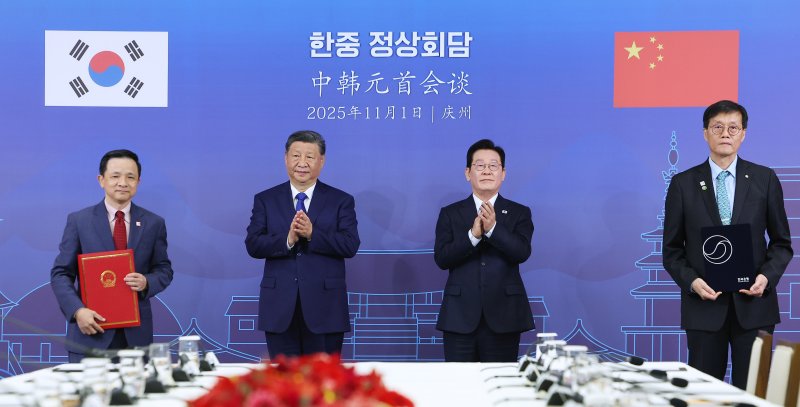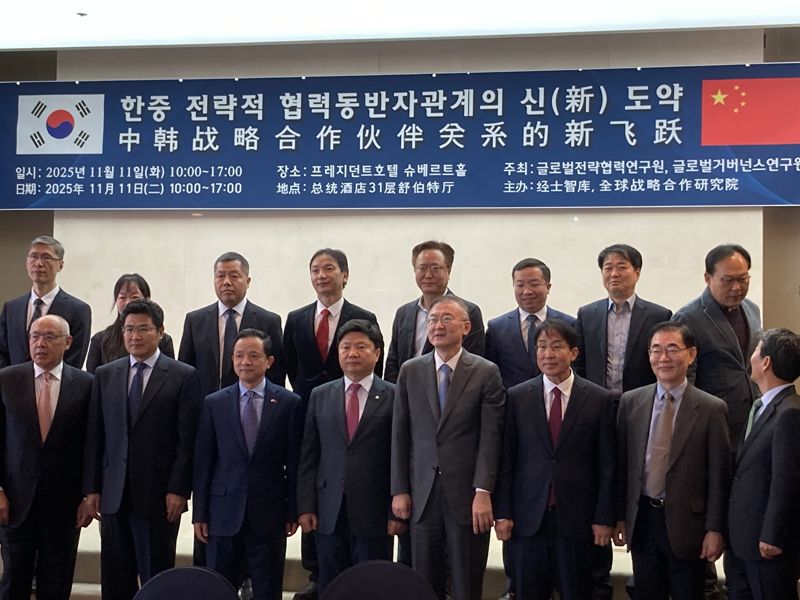Chinese Ambassador Dai Bing: “Xi Jinping and President Lee Jae-myung Reached a Consensus”... Expresses Concern Over Far-Right Anti-China Protests
- Input
- 2025-11-11 12:40:34
- Updated
- 2025-11-11 12:40:34

Chinese Ambassador Dai Bing stated, “During President Xi Jinping’s state visit to South Korea and the first face-to-face summit between the two leaders, irreplaceable strategic leadership was demonstrated for the development of both countries.”
On the 11th, at a bilateral think tank dialogue held at Hotel President in Seoul under the theme 'A New Leap Forward in the Strategic Cooperative Partnership between South Korea and China,' Ambassador Dai Bing explained, “President Xi’s attendance at the Asia-Pacific Economic Cooperation (APEC) summit itself was a valuable show of support for South Korea, the host nation.”
He continued, “During the consultation process for the Gyeongju Declaration announced by President Lee, the Chinese side provided very strong support to South Korea,” and emphasized, “If South Korea had not been the host, China would not have been able to offer such robust support.”
However, he expressed regret that some countries opposed including references to the World Trade Organization (WTO) and the International Monetary Fund (IMF) in the Gyeongju Declaration.
He added, “The South Korea-China summit was originally scheduled for one hour but actually lasted 100 minutes,” and said, “Through this summit, a series of important consensuses were reached, and the strategic cooperative partnership was reaffirmed.”
Ambassador Dai Bing noted, “More than ten cooperation documents were signed in areas such as economy, trade, finance, and law enforcement, and these achievements clearly demonstrate the vitality of bilateral cooperation.”
He also expressed hope for the participation of South Korean companies in China’s development plans over the next five years. Ambassador Dai Bing highlighted, “The plan approved at the 4th plenary session of the 20th Central Committee of the Chinese Communist Party (CCP) presents a blueprint for China’s development over the next five years. This will bring more opportunities for practical cooperation between the two countries,” and noted, “Some South Korean companies have already taken action.”
He also expressed expectations for increased private exchanges between the two countries. He stated that the Chinese government’s extension of the Visa Waiver Policy for South Koreans until the end of 2026 should further promote exchanges between the peoples of both countries. However, he also voiced concern over anti-China protests in South Korea.
Ambassador Dai Bing urged, “Some far-right forces in South Korea are fabricating malicious rumors about China and organizing anti-China protests. Such actions not only damage the friendly relations between the two countries but also harm South Korea’s national image. We hope the South Korean side will take appropriate measures to fundamentally resolve this issue.”
He went on to say, “As close neighbors and cooperative partners, it is inevitable that some disagreements will arise between our two countries. What matters is to approach these issues rationally, see the bigger picture, and resolve them through communication.”
On this day, Ambassador Dai Bing also made remarks directed at the United States (U.S.) and Japan. He stated, “The bilateral relationship must resist interference from third parties,” and emphasized, “Unilateral protectionism, hegemonism, and decoupling could harm the shared interests of both countries. We must jointly oppose these and uphold international fairness and justice.”
He further commented, “During this meeting, bilateral talks were also held between China and Japan, and between South Korea and Japan, but unfortunately, Japan’s new Prime Minister Sanae Takaichi has recently made negative remarks about China. This is unacceptable to China and seriously harms the development of China-Japan relations.”

rainman@fnnews.com Kim Kyung-soo Reporter